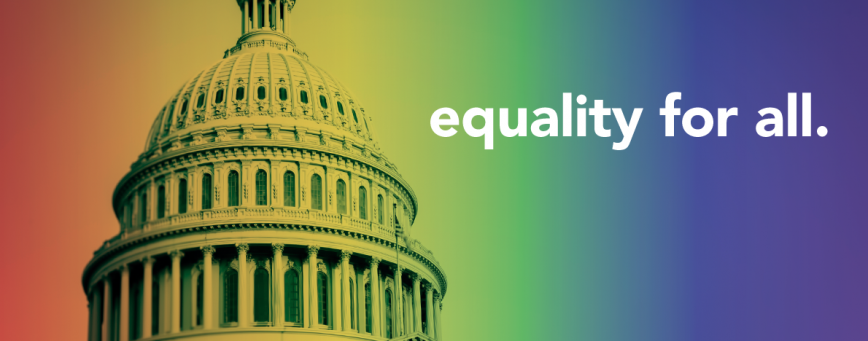
The Equality Act Continues the March Toward Justice for All
Blog Search

Today we took another important step towards securing full equality for LGBT people with the introduction of the Equality Act, a federal bill to prohibit discrimination on the basis of sexual orientation or gender identity in employment, housing, credit, education and jury service.
The bill, introduced by Oregon Sen. Jeff Merkley and Rhode Island Rep. David Cicilline, together with lead co-sponsors Senators Tammy Baldwin (D-WI) and Cory Booker (D-NJ) and Rep. John Lewis (D-GA), also prohibits discrimination based on sexual orientation, gender identity and sex by those receiving federal funding and in public accommodations.
In the past month alone, we have witnessed truly wonderful progress in the fight to end discrimination against LGBT individuals, couples and their families. The U.S. Supreme Court at the end of June issued its historic ruling in Obergefell v. Hodges that made marriage equality the law of the land. And last week, the federal Equal Employment Opportunity Commission (EEOC) ruled in Baldwin v. Foxx that the sex discrimination provisions of Title VII of the 1964 Civil Rights Act, properly understood, protect employees who suffer workplace discrimination because of their sexual orientation.
But even today, while the strides we have made are impressive, LGBT Americans continue to face pervasive, unjust, and unacceptable discrimination and have only a patchwork of protections that vary from state to state and subject them and their families to insecurity and stress when they travel, when a loved one gets sick, when they enter the workplace and when they look for a home, a loan, insurance and even lodging or transportation services.
The Equality Act will ease that stress and insecurity by establishing a clear and explicit federal law that removes any doubt that LGBT people nationwide must be treated fairly regardless of sexual orientation or gender identity.
Here’s what the Equality Act will do:
Employment
The Equality Act writes sexual orientation and gender identity explicitly into Title VII, which currently prohibits discrimination on the basis of race, color, religion, sex and national origin.
In doing so, the Equality Act codifies the protection against sex stereotyping discrimination detailed by the U.S. Supreme Court in Price Waterhouse v. Hopkins, in last week’s EEOC ruling in Baldwin v. Foxx, and in numerous other court rulings and EEOC rulings, including Lambda Legal’s historic U.S. Court of Appeals victory in Glenn v. Brumby, which applied Title VII’s sex discrimination principles to protect a transgender state worker; Macy v. Holder, the EEOC’s momentous application of Glenn v. Brumby and other Title VII cases to protect transgender federal employees; and McCreery v. Don’s Valley Market, in which Lambda Legal secured a landmark settlement in the EEOC process for a transgender woman fired for transitioning on the job in the private sector.
Importantly, the bill also requires employers to provide access to sex-segregated facilities, such as restrooms and locker rooms, for employees in accordance with their gender identity.
Public Education, Public Accommodations and Federal Funding
Like the provisions regarding employment, the Equality Act similarly writes sexual orientation and gender identity explicitly into Title IV, which prohibits discrimination in public education on the basis of race, color, religion, sex or national origin. The Equality Act also amends Titles II and VI, which concern public accommodations and federal funding, by adding sexual orientation, gender identity and sex. These titles currently prohibit discrimination only on the basis of race, color, religion and national origin.
The Equality Act similarly confirms that the sex discrimination protections in the Fair Housing Act, the Equal Credit Opportunity Act and the Jury Selection and Service Act include protection against sexual orientation and gender identity discrimination. In all, the Act makes explicit, confirms nationwide, and in some instances expands the protections for LGBT individuals and their families that numerous courts and federal agencies have found exist implicitly in current law.
Without broad, explicit and effective federal protections, the basic rights of LGBT people will continue to vary state to state and the legal landscape will remain terribly confusing and problematic for both workers and employers, tenants and landlords, customers and businesses. This is an unacceptable situation because, from the thousands of calls to Lambda Legal’s Help Desk each year, we know that LGBT Americans continue to face appalling, unjust discrimination in many aspects of their everyday lives, and that businesses of all sizes value clarity about their legal responsibilities.
In particular, we know that workplace discrimination against LGBT people is shockingly frequent. We received nearly 850 such calls in the past year alone. That is why workplace equality has been a top priority for Lambda Legal since our founding more than 40 years ago, and remains one today.
But the reality is that we also receive constant calls about discriminatory insurance denials, refusals of health care, mistreatment of students in schools and anti-LGBT harassment in a host of retail and other commercial contexts. It’s unfair, hurtful and calls for a strong, unambiguous national policy response. The Equality Act answers this call.
What happens next?
Contact your representative and senator now and ask them to join as sponsors of the Equality Act. It provides protections for LGBT people that strengthen the protections for all people.
If you feel you have experienced discrimination, contact our Legal Help Desk.
Read our FAQ about the Equality Act.
Find out more about Lambda Legal’s work on employment and rights in the workplace.
Lambda Legal provides resources for people who experience anti-LGBT discrimination. For more information, go to our Know Your Rights hub, and specifically Know Your Rights: Workplace.




